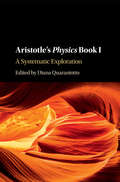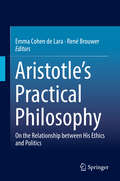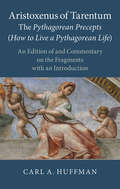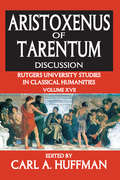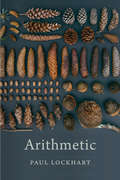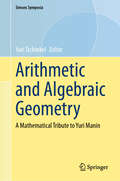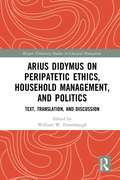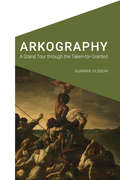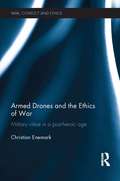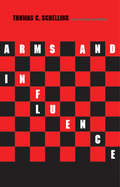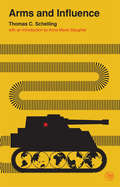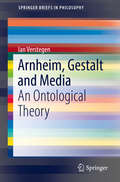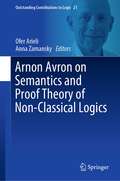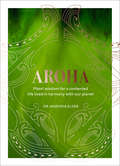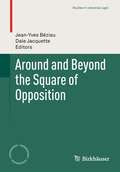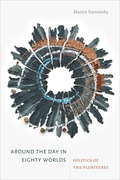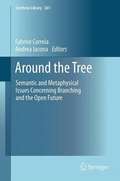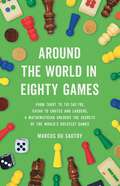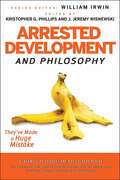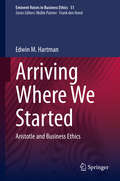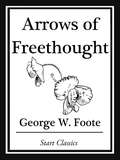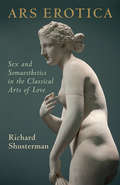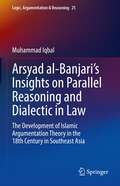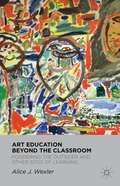- Table View
- List View
Aristotle’s Physics Book I: A Systematic Exploration
by Diana QuarantottoThis book provides a comprehensive and in-depth study of Physics I, the first book of Aristotle's foundational treatise on natural philosophy. While the text has inspired a rich scholarly literature, this is the first volume devoted solely to it to have been published for many years, and it includes a new translation of the Greek text. Book I introduces Aristotle's approach to topics such as matter and form, and discusses the fundamental problems of the study of natural science, examining the theories of previous thinkers including Parmenides. Leading experts provide fresh interpretations of key passages and raise new problems. The volume will appeal to scholars and students of ancient philosophy as well as to specialists working in the fields of philosophy and the history of science.
Aristotle’s Practical Philosophy: On the Relationship between His Ethics and Politics
by René Brouwer Emma Cohen de LaraThis book is the first collection of essays in English devoted solely to the relationship between Aristotle's ethics and politics. Are ethics and politics two separate spheres of action or are they unified? Those who support the unity-thesis emphasize the centrality for Aristotle of questions about the good life and the common good as the purpose of politics. Those who defend the separation-thesis stress Aristotle's sense of realism in understanding the need for political solutions to human shortcomings. But is this all there is to it? The contributors to this volume explore and develop different arguments and interpretative frameworks that help to make sense of the relationship between Aristotle's Ethics and Politics. The chapters loosely follow the order of the Nicomachean Ethics in examining topics such as political science, statesmanship and magnanimity, justice, practical wisdom, friendship, and the relationship between the active and the contemplative life. They have in common an appreciation of the relevance of Aristotle's writings, which offer the modern reader distinct philosophical perspectives on the relationship between ethics and politics.
Aristoxenus of Tarentum (How to Live a Pythagorean Life): An Edition of and Commentary on the Fragments with an Introduction
by Carl A. HuffmanThe Pythagorean Precepts by Aristotle's pupil, Aristoxenus of Tarentum, present the principles of the Pythagorean way of life that Plato praised in the Republic. They are our best guide to what it meant to be a Pythagorean in the time of Plato and Aristotle. The Precepts have been neglected in modern scholarship and this is the first full edition and translation of and commentary on all the surviving fragments. The introduction provides an accessible overview of the ethical system of the Precepts and their place not only in the Pythagorean tradition but also in the history of Greek ethics as a whole. The Pythagoreans thought that human beings were by nature insolent and excessive and that they could only be saved from themselves if they followed a strictly structured way of life. The Precepts govern every aspect of life, such as procreation, abortion, child rearing, friendship, religion, desire and even diet.
Aristoxenus of Tarentum: Texts and Discussion
by Carl HuffmanAristoxenus of Tarentum was reported to have been bitterly disappointed when Theophrastus was chosen instead of him to succeed Aristotle as the head of the Peripatetic School. He had a truly phenomenal output of some 453 volumes, most of which survive only in fragments. He was the most famous music theorist in antiquity and came to be referred to simply as "the musician." In addition, he was a founder of Greek biography and wrote the life histories of Pythagoras, Archytas, Socrates, and Plato among others. This volume includes eleven selections, which are almost evenly divided between his work in music theory and biography. There is a chapter on his general biographical method as well as chapters on his specific treatments of the Pythagoreans, Socrates, and Plato. There are chapters evaluating the extent to which Aristoxenus was a historian of music, his account of music therapy, his views on musical "character," the use of instruments and empiricism in his harmonic theory, and his relation to the "Neoclassical" Greek composers of the fourth century. This volume includes: "Did Aristoxenus Write Musical History?, " Andrew Barker; "Instruments and Empiricism in Aristoxenus' Elementa harmonica," David Creese; "Aristoxenus and Musical Ethos," Eleonora Rocconi; "Aristoxenus and Music Therapy: Fr. 26 Wehrli Within the Tradition on Music and Catharsis," Antonella Provenza; "Aristoxenus and the "Neoclassicists," Timothy Power; "Apollonius on Theophrastus on Aristoxenus," William W. Fortenbaugh; "Aristoxenus' Biographical Method," Stefan Schorn; "Aristoxenus and the Pythagoreans," Leonid Zhmud; "Aristoxenus' Life of Socrates," Carl A. Huffman; "Aristoxenus' Life of Plato," John Dillon; and "Aristoxenus and the Early Academy," Andrew Barker. Spanning close to three full decades, Transaction's Rutgers University Studies in Classical Humanities Series continues to pioneer in the field of classical studies.
Arithmetic
by Paul LockhartPaul Lockhart reveals arithmetic not as the rote manipulation of numbers but as a set of ideas that exhibit the surprising behaviors usually reserved for higher branches of mathematics. In this entertaining survey, he explores the nature of counting and different number systems—Western and non-Western—and weighs the pluses and minuses of each.
Arithmetic and Algebraic Geometry: A Mathematical Tribute to Yuri Manin (Simons Symposia)
by Yuri TschinkelThis book is a tribute to the memory of Yuri Ivanovich Manin, who passed away on January 7, 2023. Manin was one of the giants of modern mathematics. His work covered a wide range of fields, including logic, number theory, geometry, mathematical physics, theoretical computer science, and linguistics. The contributions collected here are on topics close to his life-long passion: arithmetic and algebraic geometry.
Arius Didymus on Peripatetic Ethics, Household Management, and Politics: Text, Translation, and Discussion (Rutgers University Studies in Classical Humanities)
by William W FortenbaughThis volume features a unique epitome (original summation) of Aristotelian practical philosophy. It is often attributed to Arius Didymus who composed a survey of Peripatetic thought on three closely related areas: ethics, household management, and politics. The quality of the epitome, which draws not only on the surviving treatises of Aristotle, but also on works by later Peripatetics, is excellent. In recent years the epitome has attracted increased attention as an important document for the understanding of Hellenistic philosophy. This new edition of the Greek text is much needed; the most recent edition dates from 1884 and is seriously faulty. This translation, provided by Georgia Tsouni, is based on the oldest and best manuscripts and takes account of recent discussions of difficult passages. In addition, an English translation appears opposite the Greek text on facing pages. The text-translation is followed by nine essays, which are written for a wide audience—not only philosophers and classicists, but also scholars interested in politics and social order. The essays also consider issues of a more philological nature: Who in fact was the author of the epitome? Is Theophrastus an important source? In discussing political matters, is the author intending to defend the practice of philosophy in Augustan Rome? Was there a second epitome, perhaps with a different slant, that has been lost?
Arkography: A Grand Tour through the Taken-for-Granted (Cultural Geographies + Rewriting the Earth)
by Gunnar OlssonIn this fascinating text Gunnar Olsson tells the story of an arkographer, who with Pallas Athene&’s blessings, travels down the Red River Valley, navigates the Kantian Island of Truth, and takes a house-tour through the Crystal Palace, the latter edifice an imagination grown out of Gunnael Jensson&’s sculpture Mappa Mundi Universalis. This travel story carries the arkographer from the oldest creation epics extant to the power struggles of today—nothing less than a codification of the taken-for-granted, a mapping of the no-man&’s-land between the five senses of the body and the sixth sense of culture. By constantly asking how we are made so obedient and predictable, the explorer searches for the present-day counterparts to the biblical ark, the chest that held the commandments and the rules of behavior that came with them—hence the term &“arkography,&” a word hinting at an as-yet-unrecognized discipline. In Arkography Olsson strips bare the governing techniques of self-declared authorities, including those of the God of the Old Testament and countless dictators, the latter supported by a horde of lackeys often disguised as elected representatives and governmental functionaries. From beginning to end, Arkography is an illustration of how every creation epic is a variation on the theme of chaos turning into cosmic order. A palimpsest of layered meanings, a play of things and relations, identity and difference. One and many, you and me.
Armed Drones and the Ethics of War: Military virtue in a post-heroic age (War, Conflict and Ethics)
by Christian EnemarkThis book assesses the ethical implications of using armed unmanned aerial vehicles (‘hunter-killer drones’) in contemporary conflicts. The American way of war is trending away from the heroic and towards the post-heroic, driven by a political preference for air-powered management of strategic risks and the reduction of physical risk to US personnel. The recent use of drones in the War on Terror has demonstrated the power of this technology to transcend time and space, but there has been relatively little debate in the United States and elsewhere over the embrace of what might be regarded as politically desirable and yet morally worrisome: risk-free killing. Arguably, the absence of a relationship of mutual risk between putative combatants poses a fundamental challenge to the status of war as something morally distinguishable from other forms of violence, and it also undermines the professional virtue of the warrior as a courageous risk-taker. This book considers the use of armed drones in the light of ethical principles that are intended to guard against unjust increases in the incidence and lethality of armed conflict. The evidence and arguments presented indicate that, in some respects, the use of armed drones is to be welcomed as an ethically superior mode of warfare. Over time, however, their continued and increased use is likely to generate more challenges than solutions, and perhaps do more harm than good. This book will be of much interest to students of the ethics of war, airpower, counter-terrorism, strategic studies and security studies in general.
Arms and Influence
by Prof. Thomas C. SchellingThe author concentrates in this book n the way in which military capabilities real or imagined are used, skillfully of clumsily, as bargaining power. He sees the steps taken by the U. S. during the Berlin and Cuban crises as not merely preparations for engagement, but as signals to and enemy, with reports from the adversary's own military intelligence as our most important diplomatic communications.
Arms and Influence (Veritas Paperbacks)
by Thomas C. Schelling&“This is a brilliant and hardheaded book. It will frighten those who prefer not to dwell on the unthinkable and infuriate those who have taken refuge in stereotypes and moral attitudinizing.&”—Gordon A. Craig, New York Times Book Review Originally published more than fifty years ago, this landmark book explores the ways in which military capabilities—real or imagined—are used, skillfully or clumsily, as bargaining power. Anne-Marie Slaughter&’s new introduction to the work shows how Schelling&’s framework—conceived of in a time of superpowers and mutually assured destruction—still applies to our multipolar world, where wars are fought as much online as on the ground.
Arnheim, Gestalt and Media: An Ontological Theory (SpringerBriefs in Philosophy)
by Ian VerstegenThis monograph presents a synthesis and reconstruction of Rudolf Arnheim’s theory of media. Combining both Arnheim’s well-known writings on film and radio with his later work on the psychology of art, the author presents a coherent approach to the problem of the nature of a medium, space and time, and the differentia between different media. The latent ontological commitments of Arnheim’s theories is drawn out by affirming Arnheim’s membership in the Brentano school of Austrian philosophy, which allows his theories to be clarified and strengthened, particularly with the metaphysical writings of Roman Ingarden. The resulting theory is relational, portraying essential medial differences with neutral criteria and allowing for a rigorous definition of a medium. The way in which a medium is based on the inherent dispositions of medial materials creates a highly appealing theory that is determinate without being deterministic. The theory is thus highly timely as people in media studies seek to address the determinate nature of media after the post-medium condition. The book will appeal to researchers and graduate students in cultural and media studies as well as architecture and design.
Arnon Avron on Semantics and Proof Theory of Non-Classical Logics (Outstanding Contributions to Logic #21)
by Ofer Arieli Anna ZamanskyThis book is a collection of contributions honouring Arnon Avron’s seminal work on the semantics and proof theory of non-classical logics. It includes presentations of advanced work by some of the most esteemed scholars working on semantic and proof-theoretical aspects of computer science logic. Topics in this book include frameworks for paraconsistent reasoning, foundations of relevance logics, analysis and characterizations of modal logics and fuzzy logics, hypersequent calculi and their properties, non-deterministic semantics, algebraic structures for many-valued logics, and representations of the mechanization of mathematics.Avron’s foundational and pioneering contributions have been widely acknowledged and adopted by the scientific community. His research interests are very broad, spanning over proof theory, automated reasoning, non-classical logics, foundations of mathematics, and applications of logic in computer science and artificial intelligence. This is clearly reflected by the diversity of topics discussed in the chapters included in this book, all of which directly relate to Avron’s past and present works. This book is of interest to computer scientists and scholars of formal logic.
Aroha: Maori wisdom for a contented life lived in harmony with our planet
by Hinemoa ElderAs seen on Oprah's Book Club! The #1 New Zealand Bestseller! Discover how to live a happier life - simple, traditional wisdom for difficult modern times.Aroha is an ancient Maori word and way of thinking. Maori psychiatrist Dr Hinemoa Elder explores how Aroha can help us all by sharing 52 thought-provoking whakatauki, traditional Maori life lessons - one for each week of the year.Discover how we can all find greater contentment and kindness for ourselves, each other and our world by understanding how we might invite the values of Aroha into our daily lives.Ki te kotahi te kakaho ka whati, ki te kapuia, e kore e whati.When we stand alone we are vulnerable but together we are unbreakable.
Around and Beyond the Square of Opposition (Studies in Universal Logic)
by Dale Jacquette Jean-Yves BéziauThe theory of oppositions based on Aristotelian foundations of logic has been pictured in a striking square diagram which can be understood and applied in many different ways having repercussions in various fields: epistemology, linguistics, mathematics, sociology, physics. The square can also be generalized in other two-dimensional or multi-dimensional objects extending in breadth and depth the original Aristotelian theory. The square of opposition from its origin in antiquity to the present day continues to exert a profound impact on the development of deductive logic. Since 10 years there is a new growing interest for the square due to recent discoveries and challenging interpretations. This book presents a collection of previously unpublished papers by high level specialists on the square from all over the world.
Around the Cragged Hill: A Personal and Political Philosophy
by George F. KennanWinner of the National Book Award and two Pulitzer Prizes, diplomat and scholar Kennan now steps forth with a compelling, provocative testament for our times -- a brilliant look at the problems facing America today.
Around the Day in Eighty Worlds: Politics of the Pluriverse (Thought in the Act)
by Martin SavranskyIn Around the Day in Eighty Worlds Martin Savransky calls for a radical politics of the pluriverse amid the ongoing devastation of the present. Responding to an epoch marked by the history of colonialism and ecological devastation, Savransky draws on the pragmatic pluralism of William James to develop what Savransky calls a “pluralistic realism”—an understanding of the world as simultaneously one and many, ongoing and unfinished, underway and yet to be made. Savransky explores the radical multifariousness of reality by weaving key aspects of James's thought together with divergent worlds and stories: of Magellan's circumnavigation, sorcery in Mozambique, God's felt presence among a group of evangelicals in California, visible spirits in Zambia, and ghosts in the wake of the 2011 tsunami in Japan. Throughout, he experiments with these storied worlds to dramatize new ways of approaching the politics of radical difference and the possibility of transforming reality. By exploring and constructing relations between James's pluralism and the ontological turn in anthropology, Savransky offers a new conceptualization of the pluriverse that fosters modes of thinking and living otherwise.
Around the Tree: Semantic and Metaphysical Issues Concerning Branching and the Open Future (Synthese Library #361)
by Fabrice Correia Andrea IaconaOver the past few years, the tree model of time has been widely employed to deal with issues concerning the semantics of tensed discourse. The thought that has motivated its adoption is that the most plausible way to make sense of indeterminism is to conceive of future possibilities as branches that depart from a common trunk, constituted by the past and the present. However, the thought still needs to be further articulated and defended, and several important questions remain open, such as the question of how actuality can be understood and formally represented in a branching framework. The present volume is intended to be a 360 degree reflection on the tree model. The contributions is gathers concern the model and its alternatives, both from a semantic and from a metaphysical point of view.
Around the World in Eighty Games: From Tarot to Tic-Tac-Toe, Catan to Chutes and Ladders, a Mathematician Unlocks the Secrets of the World's Greatest Games
by Marcus du SautoyA &“fun&” and &“unexpected&” (The Economist) global tour of the world&’s greatest games and the mathematics that underlies them Where should you move first in Connect 4? What is the best property in Monopoly? And how can pi help you win rock paper scissors? Spanning millennia, oceans and continents, countries and cultures, Around the World in Eighty Games gleefully explores how mathematics and games have always been deeply intertwined. Renowned mathematician Marcus du Sautoy investigates how games provided the first opportunities for deep mathematical insight into the world, how understanding math can help us play games better, and how both math and games are integral to human psychology and culture. For as long as there have been people, there have been games, and for nearly as long, we have been exploring and discovering mathematics. A grand adventure, Around the World in Eighty Games teaches us not just how games are won, but how they, and their math, shape who we are.
Arrested Development and Philosophy
by J. Jeremy Wisnewski Kristopher PhillipsA smart philosophical look at the cult hit television show, Arrested Development Arrested Development earned six Emmy awards, a Golden Globe award, critical acclaim, and a loyal cult following-and then it was canceled. Fortunately, this book steps into the void left by the show's premature demise by exploring the fascinating philosophical issues at the heart of the quirky Bluths and their comic exploits. Whether it's reflecting on Gob's self-deception or digging into Tobias's double entendres, you'll watch your favorite scenes and episodes of the show in a whole new way. Takes an entertaining look at the philosophical ideas and tensions in the show's plots and themes Gives you new insights about the Bluth family and other characters: Is George Michael's crush on his cousin unnatural? Is it immoral for Lindsay to lie about stealing clothes to hide the fact that she has a job? Are the pictures really of bunkers or balls? Lets you sound super-smart as you rattle off the names of great philosophers like Sartre and Aristotle to explain key characters and episodes of the show Packed with thought-provoking insights, Arrested Development and Philosophy is essential reading for anyone who wants to know more about their late, lamented TV show. And it'll keep you entertained until the long-awaited Arrested Development movie finally comes out. (Whenever that is. )
Arriving Where We Started: Aristotle and Business Ethics (Issues in Business Ethics #51)
by Edwin M. HartmanEdwin Hartman offers an account of his intellectual journey from Aristotle to organization theory to business ethics to an Aristotelian approach to business ethics. Aristotle’s work in metaphysics and psychology offers some insights into the explanation of behavior. Central to this sort of explanation is characteristically human rationality. Central to successful organizations is characteristically human sociability. That human beings are by nature rational and sociable is the basis of Aristotle’s ethics. Though a modern organization is not a polis in Aristotle’s sense, it has good reason to treat people as rational and sociable on the whole, and thereby to preserve the organization as a commons of people linked by something much like Aristotle’s account of strong friendship. Organizations that are successful in this respect, particularly those that deal with a nationally diverse workforce, may offer a far-reaching and attractive model.
Arrows of Freethought
by George W. FooteWritten by British secularist, George W. Foote, Arrows of Freethought is a compilation of numerous articles that have appeared in the Secularist, the Liberal, the National Reformer, and the Freethinker.
Ars Erotica: Sex and Somaesthetics in the Classical Arts of Love
by Richard ShustermanThe term ars erotica refers to the styles and techniques of lovemaking with the honorific title of art. But in what sense are these practices artistic and how do they contribute to the aesthetics and ethics of self-cultivation in the art of living? In this book, Richard Shusterman offers a critical, comparative analysis of the erotic theories proposed by the most influential premodern cultural traditions that shaped our contemporary world. Beginning with ancient Greece, whose god of desiring love gave eroticism its name, Shusterman examines the Judaeo-Christian biblical tradition and the classical erotic theories of Chinese, Indian, Islamic, and Japanese cultures, before concluding with medieval and Renaissance Europe. His exploration of their errors and insights shows how we could improve the quality of life and love today. By using the engine of eros to cultivate qualities of sensitivity, grace, skill, and self-mastery, we can reimagine a richer, more positive vision of sex education.
Arsyad al-Banjari’s Insights on Parallel Reasoning and Dialectic in Law: The Development of Islamic Argumentation Theory in the 18th Century in Southeast Asia (Logic, Argumentation & Reasoning #25)
by Muhammad IqbalThis book provides an epistemological study of the great Islamic scholar of Banjarese origin, Syeikh Muhammad Arsyad al-Banjari (1710-1812) who contributed to the development of Islam in Indonesia and, in general, Southeast Asia. The work focuses on Arsyad al-Banjari’s dialectical use and understanding of qiyās or correlational inference as a model of parallel reasoning or analogy in Islamic jurisprudence. This constituted the most prominent instrument he applied in his effort of integrating Islamic law into the Banjarese society.This work studies how Arsyad al-Banjari integrates jadal theory or dialectic in Islamic jurisprudence, within his application of qiyās. The author develops a framework for qiyās which acts as the interface between jadal, dialogical logic, and Per Martin-Löf’s Constructive Type Theory (CTT). One of the epistemological results emerging from the present study is that the different forms of qiyās applied by Arsyad al-Banjari represent an innovative and sophisticated form of reasoning. The volume is divided into three parts that discuss the types of qiyās as well their dialectical and argumentative aspects, historical background and context of Banjar, and demonstrates how the theory of qiyās comes quite close to the contemporary model of parallel reasoning for sciences and mathematics developed by Paul Bartha (2010). This volume will be of interest to historians and philosophers in general, and logicians and historians of philosophy in particular.
Art Education Beyond the Classroom
by Alice J. WexlerBy focusing on children and adults with disabilities, each contributor offers critical research which challenges the non-transferable divide between us and them , encouraging art teachers, therapists, critics, and general readers alike to uncover their biases regarding the nature of art and education.
